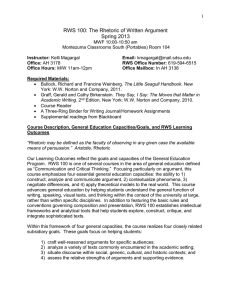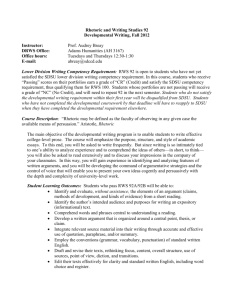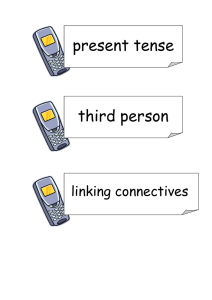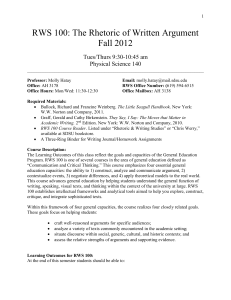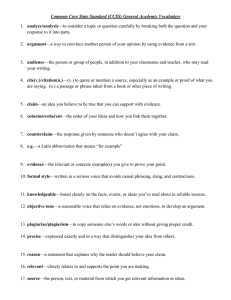Rhetoric of Written Arguments in Context
advertisement
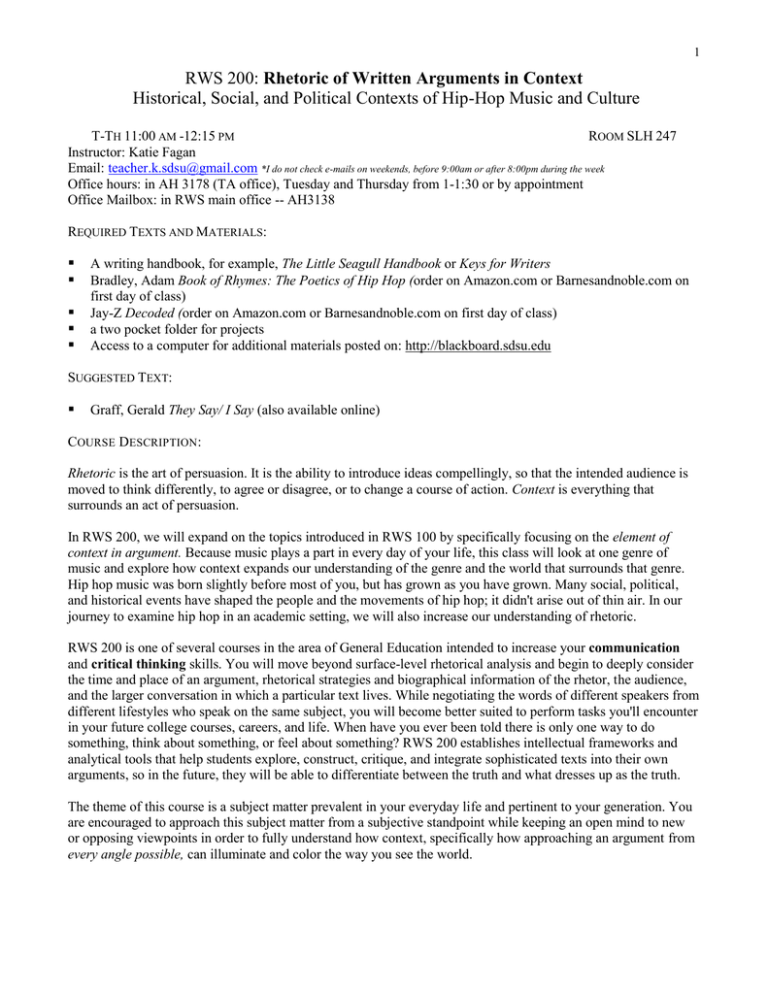
1 RWS 200: Rhetoric of Written Arguments in Context Historical, Social, and Political Contexts of Hip-Hop Music and Culture T-TH 11:00 AM -12:15 PM ROOM SLH 247 Instructor: Katie Fagan Email: teacher.k.sdsu@gmail.com *I do not check e-mails on weekends, before 9:00am or after 8:00pm during the week Office hours: in AH 3178 (TA office), Tuesday and Thursday from 1-1:30 or by appointment Office Mailbox: in RWS main office -- AH3138 REQUIRED TEXTS AND MATERIALS: A writing handbook, for example, The Little Seagull Handbook or Keys for Writers Bradley, Adam Book of Rhymes: The Poetics of Hip Hop (order on Amazon.com or Barnesandnoble.com on first day of class) Jay-Z Decoded (order on Amazon.com or Barnesandnoble.com on first day of class) a two pocket folder for projects Access to a computer for additional materials posted on: http://blackboard.sdsu.edu SUGGESTED TEXT: Graff, Gerald They Say/ I Say (also available online) COURSE DESCRIPTION: Rhetoric is the art of persuasion. It is the ability to introduce ideas compellingly, so that the intended audience is moved to think differently, to agree or disagree, or to change a course of action. Context is everything that surrounds an act of persuasion. In RWS 200, we will expand on the topics introduced in RWS 100 by specifically focusing on the element of context in argument. Because music plays a part in every day of your life, this class will look at one genre of music and explore how context expands our understanding of the genre and the world that surrounds that genre. Hip hop music was born slightly before most of you, but has grown as you have grown. Many social, political, and historical events have shaped the people and the movements of hip hop; it didn't arise out of thin air. In our journey to examine hip hop in an academic setting, we will also increase our understanding of rhetoric. RWS 200 is one of several courses in the area of General Education intended to increase your communication and critical thinking skills. You will move beyond surface-level rhetorical analysis and begin to deeply consider the time and place of an argument, rhetorical strategies and biographical information of the rhetor, the audience, and the larger conversation in which a particular text lives. While negotiating the words of different speakers from different lifestyles who speak on the same subject, you will become better suited to perform tasks you'll encounter in your future college courses, careers, and life. When have you ever been told there is only one way to do something, think about something, or feel about something? RWS 200 establishes intellectual frameworks and analytical tools that help students explore, construct, critique, and integrate sophisticated texts into their own arguments, so in the future, they will be able to differentiate between the truth and what dresses up as the truth. The theme of this course is a subject matter prevalent in your everyday life and pertinent to your generation. You are encouraged to approach this subject matter from a subjective standpoint while keeping an open mind to new or opposing viewpoints in order to fully understand how context, specifically how approaching an argument from every angle possible, can illuminate and color the way you see the world. 2 COURSE REQUIREMENTS: Projects: You will write three major papers and collaborate on one major group presentation for this course. Each paper will require at least one rough draft or peer review, or both. All pre-writing, rough drafts, and final drafts are due in-class and/or online on the date and time specified. Specific criteria and due dates for each paper will be given with each prompt. Peer review: One or more drafts will be required for each writing assignment. You will “workshop” the paper with your peers in class/on Turnitin.com, both gaining and giving feedback. You will complete feedback forms in peer review and be evaluated based on evidence of engagement in the activity. There will be a workshop on Turnitin.com early in the semester to make sure you can carry on with the assigned tasks. Homework: Students will be responsible for completing small, independent assignments, which will be discussed in class the day before they are due. Weekly Outside Reading Reports: Each week, please read an opinion/editorial article, watch a music or YouTube video, or read some other academic text that illuminates some contextual element of your assigned readings. Please summarize the text, state the author's main claim and support and discuss how this text relates to or informs your understanding about one of the assigned readings in our class. Turn this discussion in on Blackboard with a link to the article. You will be expected to complete these once a week starting the second week of class (for a total of 15, of which you will be evaluated at random throughout the semester). Blackboard: Students should review Blackboard to access all important information required of this class, such as assignments, readings/materials, and this syllabus. I will inform you in advance of the times you will need to go to the website to complete assignments. Class Openers: I will begin every class with a song that brings up some contextual element. If you come accross a song that you would like to share with the class, you can talk to me about leading a short lesson and this will count toward your participation grade or take place of one of your outside reading reports. Participation/ Student Responsibilities: Be self-motivated; have a positive attitude Keep track of assignments and handouts Ask questions and/or come see me when you don’t understand something Have the reading/writing done for class Make a positive contribution to class discussions Work in groups for various activities (Collaborative Learning) For every one hour of class, schedule at least two to three hours for homework/studying Be prepared to begin and end class on time GRADING/EVALUATION: Assignment 3 major projects (200 points each)* Final presentation (150 points) Homework (150 points)** Participation/ Attendance** (100 points) Total: Points/ % of grade 600 / 60% (20% each) 150/ 15% 150/ 15% 100/ 10% 1000 / 100% *Drafting, conferencing and peer-reviews will be part of your major project grade. **Homework grade includes all short assignments and outside reading reports. **Participation grade includes quizzes, group work, class openers and other in-class assignments. 3 PROJECT DRAFT 1 DUE DATE Paper 1 Paper 2 Paper 3 Presentation February 14 March 14 April 18 Scheduled conferences with me DRAFT 2 DUE DATE February 26 March 21 April 25 Presentations last two weeks of class *All assignments, percentages, and due dates are subject to change at the instructor’s discretion. POLICES (IN ALPHABETICAL ORDER) Attendance: Students are allowed no more than 3 absences during the semester. Missing more than 3 classes will result in a minimum of a 5% reduction in the class participation grade. Be on time and do not leave early. Be Respectful: Thank you (anyone who does not feel up to this on any given day will be asked to leave my classroom and be marked absent). Electronics: Please turn off your cell phones, iPods, and other electronic equipment when you come to class. Should you feel the need to use a computer to take notes, you must type a one paragraph statement explaing why it is necessary and how it will not become a distraction in class (due by the second week of classes). Should the computer prove to be a distraction, I will revoke your request. Papers: All papers are due on the date specified, unless otherwise instructed. All papers must be typed and adhere to MLA format. Late assignments will not be accepted. Of course, we are all human and things happen that we cannot control. As you would do with a boss, you should and are encouraged to contact me if you cannot attend class or turn in an assignment on time. However, you should let me know before or as soon as possible about any unplanned occurances which inhibit you from performing to your best ability in this class. I will require that events that prevent you from attending class, missing assignments, etc. will only be excused with documentation and a meeting with me to discuss make-up plans. Plagiarism: All work in this course must be original; academic integrity is expected at all times. Plagiarism in any class will result in serious consequences ranging from grade reduction to failure in the class to expulsion from the college. The university catalog describes plagiarism as follows: “Plagiarism is formal work publicly misrepresented as original; it is any activity wherein one person knowingly, directly, and for lucre, status, recognition, or any public gain resorts to the published or unpublished work of another in order to represent it as one’s own. Work shall be deemed plagiarism: (1) when prior work of another has been demonstrated as the accessible source; (2) when substantial or material parts of the source have been literally or evasively appropriated (substance denoting quantity; matter denoting qualitative format or style); and (3) when the work lacks sufficient or unequivocal citation so as to indicate or imply that the work was neither a copy nor an imitation. This definition comprises oral, written, and crafted pieces. In short, if one purports to present an original piece but copies ideas word for word or by paraphrase, those ideas should be duly noted.” (from SDSU General Catalog 2009-2010. San Diego State University, 2009: 455) For more information on the university cheating and plagiarism policy, please visit: http://wwwrohan.sdsu.edu/dept/senate/ policy/pfacademics.html. SDSU’s library also has an excellent tutorial on how to avoid plagiarism. PROJECT PROCEDURE: 4 First Draft: You will submit an electronic copy of a complete rough draft and receive my feedback for the second draft and complete a revision activity. Peer Review Workshops: Getting feedback from others and revising drafts multiple times is an important aspect of the writing process, especially in the professional world. For this reason, peer review will be a part of each major project. You will receive a grade for participation in this process. Final Draft: Be sure to consider my comments and those of your peers in your final drafts. I will look at your previous work to see if you are making thoughtful improvements. Think of "reversions" not "revisions." Conferencing: You must conference with me about a major project at least one time during the semester. You can do this during the drafting stage or after receiving comments on a final draft. Failure to conference with me at least one time will result in a loss of 10 points from each major paper. COURSE ASSISTANT SERVICES Office hours: I encourage all students to attend office hours (and by appointment), but especially if you have any questions or concerns about reading, writing, the course, or college in general. Please make an appointment with me in advance via e-mail. Please bring necessary materials to office hours including, but not limited to, your notes, pre-writing, drafts, and final drafts of your papers with comments. It will assist me in answering any questions you may have on the assignments, as well as promote an effective discussion. RWS Tutoring: SDSU has an excellent staff of tutors to assist students in all courses. Students who need assistance with course concepts or writing assignments in English or ESL are encouraged to contact the department of Rhetoric and Writing Studies at (619) 594-6515 for more information on drop-in tutoring hours or you can visit the tutoring office in the Library dome. Disabled students: Every attempt will be made to offer reasonable accommodations for students with disabilities in this course. Students with disabilities who may need accommodations in this class are encouraged to notify the instructor privately and to contact Student Disability Services (SDS) as soon as possible. All discussion of disabilities will take place privately to protect student confidentiality. SDS staff are available in the Capulli Center in Suite 3101 or by phone at (619) 594-6473 (voice) or (619) 594-2929 (TTD/TTY). Counseling: There are many events and situations that put additional stress on being a student. SDSU has an excellent center for Counseling & Psychological Services. To set up an initial consultation, call (619) 594-5220. For immediate or emergency help, you are welcome to use San Diego’s free 24-hour counseling access line at (800) 479-3339. C&PS on campus also has a “Center for Well-Being” with multiple stations for relaxation if you are feeling stressed. C&PS is located in the Capulli Center, Room 4401. Student athletes: If you are a student athlete with away games scheduled during the semester, let me know by the end of the first week of class, and present me with a copy of your team travel schedule. We will then make appropriate scheduling arrangements working in conjunction with Student-Athlete Support Services (SASS) to help you excel in this course. For more information on SASS’ academic advising and tutoring services, call (619) 594-4743. COURSE OUTLINE AND READING SCHEDULE Please note that the following schedule is approximate, as dates and topics may shift as the semester continues. Please refer to Blackboard for current information regarding your assignment due dates. With the exception of Crips and Bloods: Made in America, all readings are expected to be completed outside of class before the first class discussion date. Schedule 5 Week 1: January 17 • Introduction to RWS 200 Week 2: January 22, 24 • Introduction to Rhetorical Context Week 3: January 29, 31 • Unit 1: Context Analysis Week 4: February 5, 7 • Unit 1 Week 5: February 12, 14 • Unit 1 Rough Draft Due (2/14) Week 6: February 19, 21 • Unit 1 Final Draft Due (2/21) Week 7: February 26, 28 • Unit 2: Researching Context Week 8: March 5, 7 • Unit 2 Week 9: March 12, 14 • Unit 2 Rough Draft Due (3/14) Week 10: March 19, 21 • Unit 2 Final Paper Due (3/21); Introduce Unit 3 and Unit 4 Week 11: March 26, 28 • Unit 3: Analyzing arguments in the context of each other April 1-5 Spring Break Week 12: April 9, 11 • Unit 3 Week 13: April 16, 18 • Unit 3 Rough Draft Due (4/18) Week 14: April 23, 25 • Unit 3 Final Draft Due (4/25) Week 15: April 30, May 2 • Unit 4: Entering the Conversation: Making an Argument in Contemporary Context • Presentations Week 16: May 7 • Unit 4 • Presentations No Final Exam Course Learning Outcomes The following four outcomes describe the four major writing projects for the course. Students will be able to: 6 construct an account of an argument and identify elements of context embedded in it, the clues that show what the argument is responding to--both in the sense of what has come before it and in the sense that it is written for an audience in a particular time and place; examine a writer’s language in relation to audience, context and community; follow avenues of investigation that are opened by noticing elements of context; research those elements and show how one's understanding of the argument is developed, changed, or evolved by looking into its context; given the common concerns of two or more arguments, discuss how the claims of these arguments modify, complicate or qualify one another; consider their contemporary, current life as the context within which they are reading the arguments assigned in the class; position themselves in relation to these arguments and additional ones they have researched in order to make an argument; draw on available key terms, concepts or frameworks of analysis to help shape the argument. The following points describe outcomes to work on throughout the semester, to be attained over the 15 weeks: Building on the work done in RWS 100, students will be able to: articulate what argument a text is making; describe the work that is done by each section of the argument; describe elements of the argument—claims, methods of development, kinds of evidence, persuasive appeals; translate an argument into their own words; understand and incorporate all aspects of the writing process--including prewriting, drafting, revising, editing, and proofreading; articulate what key terms, definitions, concepts, statements of a problem or issue are established by a text; investigate and articulate how an argument is positioned—based on certain kinds of assumptions, located in a way of thinking and representing issues from a point of view; work with multiples sources in a paper, deciding what to include and what to exclude, choosing an effective structure, and creating significant relationships among sources; analyze and assess arguments made by visual texts; incorporate visual images into their documents; craft a cohesive paper, and use effective metadiscourse to articulate the project of the paper and guide a reader through it; describe their own papers and reflect on how they wrote them; differentiate between the content of their texts and the language and rhetorical strategies they employ; assign significance to the arguments they read; revise their own work effectively, re-reading previous work and re-envisioning it in the light of reflection, feedback, further reading and new sources of information; edit their writing for the grammar and usage conventions appropriate to the project.
